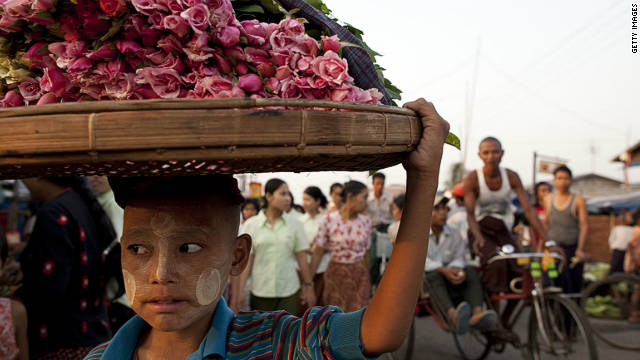November 30, 2011 -- Updated 0540 GMT (1340 HKT)

(CNN) -- When Hillary Clinton arrives in Myanmar on Wednesday she will be looking for signs of real change from the government reforms undertaken by the one-time reclusive military state.
The historic two-day visit, the first by a U.S. Secretary of State in 50 years, comes in the wake of concessions by the new government of President Thein Sein. His government freed dozens of political prisoners last month following the earlier release of Nobel Peace Laureate and opposition leader Aung San Suu Kyi.
But Myanmar democracy veteran Win Tin, the 82-year-old National League for Democracy free speech campaigner who spent almost 20 years in prison, says the changes are cosmetic and will only benefit the country's ruling elite.
"Changes happen, but actually they happen on paper," Win Tin told CNN's Paula Hancock. "(There have been) announcements to the media and (talks with) Aung San Suu Kyi and so on.
"But at the grass roots level there is no change at all. People suffer a lot ... people suffer human rights violations."
He told CNN he did not know what was driving the reforms but suggested that members of the government could fear prosecution for human rights abuses, if the opposition wins parliamentary elections in three months' time.
On the streets, market traders had mixed reaction to the new reforms.
"I've been working day and night for years to make ends meet -- I hope our lives will finally get better," one street trader told CNN.
Another market trader, however, said he hadn't seen any reforms and was "too busy working" to even know that Clinton was arriving in the country.
Signs of change are visible in Yangon, the former capital now replaced by Naypyidaw and a dilapidated time capsule of colonial-era architecture. Tourists and foreign businesspeople are arriving in greater numbers.
The United States has greeted the reforms with cautious optimism, still referring to the country as Burma, the name the country used before democratic election results were thrown out by the military junta more than 25 years ago.
"After years of darkness, we've seen flickers of progress," U.S. President Barack Obama said November 18 in announcing Clinton's trip to Myanmar.
Aung San Suu Kyi, who was released from house arrest on November 13, 2010, supports U.S. engagement with Myanmar's leaders, and many say Clinton's trip may not have happened without Aung San Suu Kyi's blessing.
The Obama administration is still concerned, officials say, about Myanmar's closed political system, its treatment of minorities and holding of political prisoners.
Clinton said the U.S. wants more political prisoners released, a "real" political process with elections and an end to conflicts with ethnic minorities that have displaced tens of thousands of the country's residents.
The U.S. administration says it is not ending sanctions or making any abrupt changes in policy.
"If Burma fails to move down the path of reform," Obama said, it will continue to face sanctions and isolation. But if it seizes this moment, then reconciliation can prevail, and millions of people may get the chance to live with a greater measure of freedom, prosperity and dignity. And that possibility is too important to ignore."

Comments